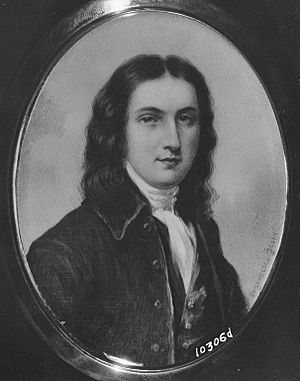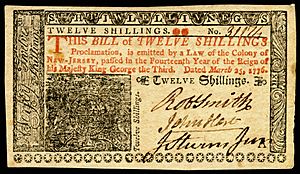John Hart (New Jersey politician) facts for kids
Quick facts for kids
John Hart
|
|
|---|---|
 |
|
| Born | December 21, 1713 Hopewell, New Jersey
|
| Died | May 11, 1779 |
| Resting place | Old School Baptist Meeting House Burial Ground, Hopewell, New Jersey |
| Occupation | Public official/politician |
| Known for | Signing the United States Declaration of Independence |
| Signature | |
John Hart was an important person in colonial New Jersey. He was born around 1713 and died on May 11, 1779. He worked as a public official and politician. He was chosen to be a representative for New Jersey in the Continental Congress. This was a meeting of leaders from the American colonies. John Hart is famous for signing the Declaration of Independence. Because of this, he is known as one of the Founding Fathers of the United States.
Contents
Early Life and Family
John Hart was likely born in 1713 in Hopewell Township, New Jersey. His father, Captain Edward Hart, was a farmer and a leader in the community. His grandfather, also named John Hart, came to Hopewell from Newtown, Long Island.
In 1741, John Hart married Deborah Scudder. They had thirteen children together. Sadly, Deborah passed away in 1776. In 1747, John Hart gave some of his land to a group of Baptists. They used this land to build a church, which became known as the Old Baptist Meeting House.
Political Career and Public Service
John Hart started his political career in 1750. He was elected to the Hunterdon County Board of Chosen Freeholders. This was a local government group in New Jersey. In 1761, he was elected to the New Jersey Colonial Assembly. This was like the state's law-making body before America became independent. He served there for ten years.
He also joined groups that helped organize the American Revolution. These included the local Committee of Safety and the Committee of Correspondence. He also became a judge. People often called him "Honest John" because he was known for being fair and trustworthy.
In 1776, New Jersey created a new government called the revolutionary assembly. John Hart was elected to it and became its vice president. At first, New Jersey's representatives in the Second Continental Congress did not want independence. So, the entire group was replaced. John Hart was chosen to join the Congress. He arrived just in time to vote for and sign the Declaration of Independence.
After signing the Declaration, he became the speaker of the new New Jersey General Assembly. This meant he was the leader of the state's law-making body. He also took on other important jobs. He was the Treasurer of the Council of Safety and a commissioner for the State Loan Office.
During the Revolutionary War

In December 1776, British soldiers moved into New Jersey. Because John Hart was a leader in the new government, he was a target. He had to hide for a short time in the nearby Sourland Mountains. British and Hessian troops raided his farm. They caused damage but did not destroy his property.
When American soldiers won the Battle of Trenton on December 26, John Hart was able to return home. Later, before the Battle of Monmouth, John Hart invited General George Washington and the Continental Army to camp on his farm. His offer was accepted. From June 22 to 24, 1778, about 12,000 soldiers stayed in his fields. General Washington even ate dinner with John Hart at least once.
Death and Lasting Impact
In November 1778, John Hart became very ill with kidney stones. He suffered from this painful sickness for more than six months. He passed away on May 11, 1779, at the age of 65. He was buried at the Old Baptist Meeting House, the church he had helped to build.
An obituary, a notice about his death, was published on May 19, 1779. It said that John Hart had served his country faithfully. It also mentioned that everyone respected his character and actions. This shows how much he was valued by the people.
Several roads are named after John Hart today. These include Hart Boulevard in Flemington, New Jersey, Hart Avenue in Hopewell, New Jersey, and Hart Lane in Ringoes, New Jersey.
See also


